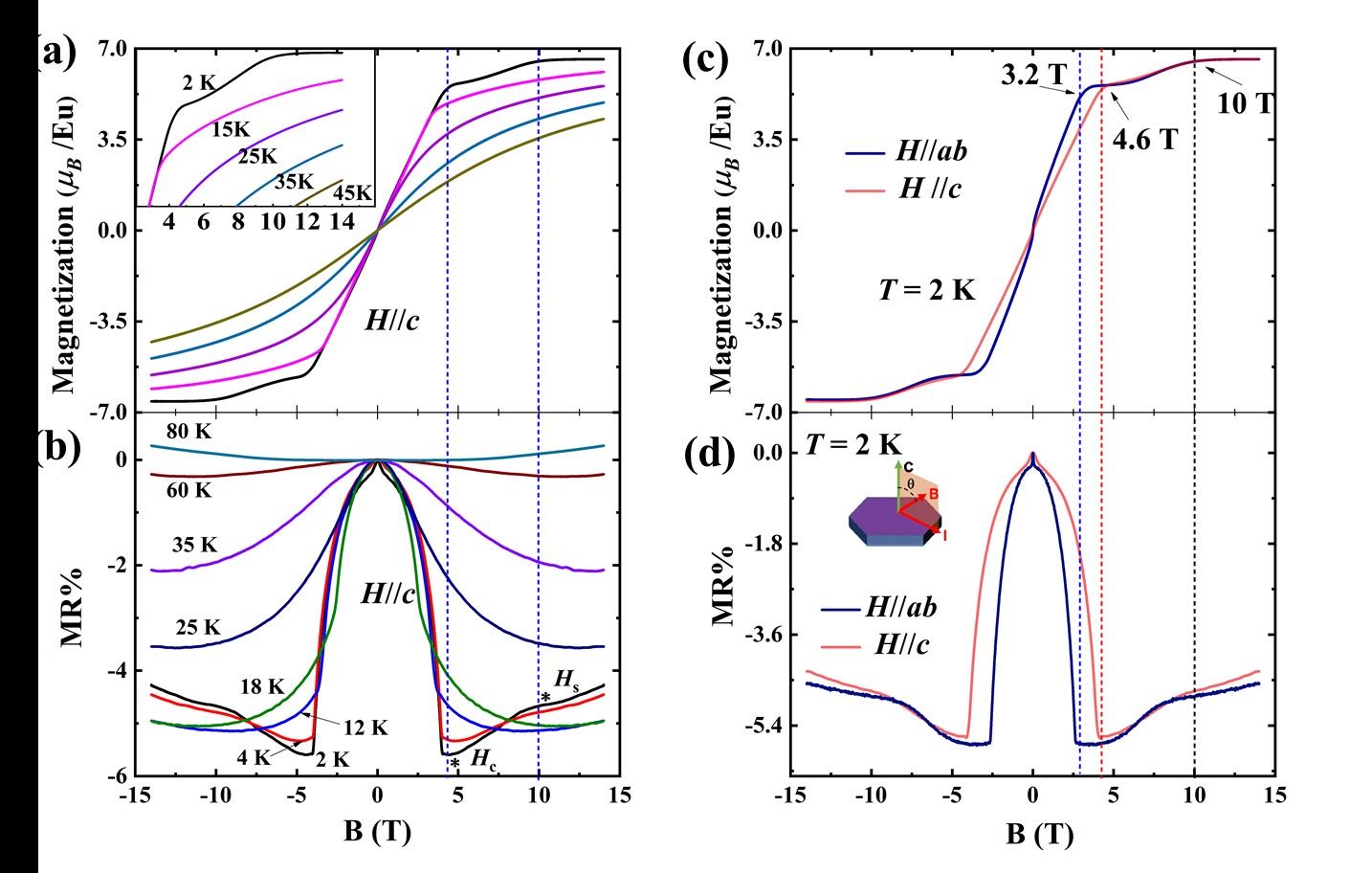
Researchers from Hefei Institutes of Physical Science (HFIPS), Chinese Academy of Sciences and Anhui university, made new progress on physical properties of magnetic topological insulator, by using the related experimental apparatuses of steady high magnetic field laboratory.
The quantum anomalous Hall (QAH) effect was first realized in the magnetically doped thin (Bi, Sb)2Te3 topological insulator (TI) films at extremely low temperatures. A lot of theoretical and experimental efforts have been made to explore the stoichiometric TIs with an inherent magnetic order. MnBi2Te4 has been found as an intrinsic A-type antiferromagnetic (AFM) TI with Mn ferromagnetic (FM) layers stacked antiferromagnetically along the c-axis. Meantime, the Eu-based magnetic material EuSn2As2, one of the intrinsic magnetic topological insulators, has also been confirmed by spectroscopy studies. Its magnetic ground states at low temperatures are mostly A-type AFM state like MnBi2Te4. The interplay between ordered magnetic state and the topological electronic state are expected to induce abundant novel quantum states.
"We grew high quality EuSn2As2 single crystal via Sn flux," said ZHU Xiangde, a physicist from high magnetic field laboratory, HFIPS, “then investigated systematic magnetoresistance and magnetization measurements under high magnetic field."
Both the kink of magnetic susceptibility and longitudinal resistivity revealed that EuSn2As2 undergoes an AFM transition at TN = 21K. With the help of low temperature apparatus in high magnetic field laboratory, researchers can measure the magnetization and magnetoresistance up to 16T. At T = 2K, the magnetization exhibits two successive plateaus of ~ 5.6μB/Eu between 4.6T to 6T for H//c and ~ 6.6μB/Eu at ~10T-14T for H//c. Combined with the negative longitudinal MR and abnormal Hall resistance, they demonstrated that EuSn2An2 undergoes complicated magnetic transitions from an AFM state to a canted ferromagnetic (FM) state at Hc and then to a polarized FM state at Hs as the magnetic field increase. Meanwhile, at T = 2K, a distinct negative MR as large as 5.7% was observed around the critical field of the first magnetization plateau Hc = 4.6T. Then the MR curve turns up with a positive slope as the field increases followed by a kink at the field, Hs = 10T, of the second magnetization plateau.
The successive magnetization plateaus observed in EuSn2As2 has provided more opportunities to study on its complicated magnetic structures. The magnetic momentum of ~ 5.6μB/Eu atom at the first critical filed Hc is quite smaller than the theoretical value of 7μB/Eu2+, which clearly reveals a magnetic field induced magnetic transition from AFM state to canted FM state between Hc and Hs.
"This is similar to MnBi2Te4,” said ZHU, “it tell us the possibility to explore the quantum hall effect in this type compounds.”
Their findings have been published on Physical Review B.
Link to the paper: Magnetic properties of the layered magnetic topological insulator EuSn2As2

(a) and (b) are the magnetization and the MR curves with H//c axis at various temperatures. The inset is a close-up of the M-H curves near Hc and Hs. (c) and (d) are the magnetization and MR curves at 2K with H//c axis and H//ab-plane, respectively. (Image by ZHU Xiangde)
Contact:
ZHAO Weiwei
Hefei Institutes of Physical Science (http://english.hf.cas.cn/)
Email: annyzhao@ipp.ac.cn